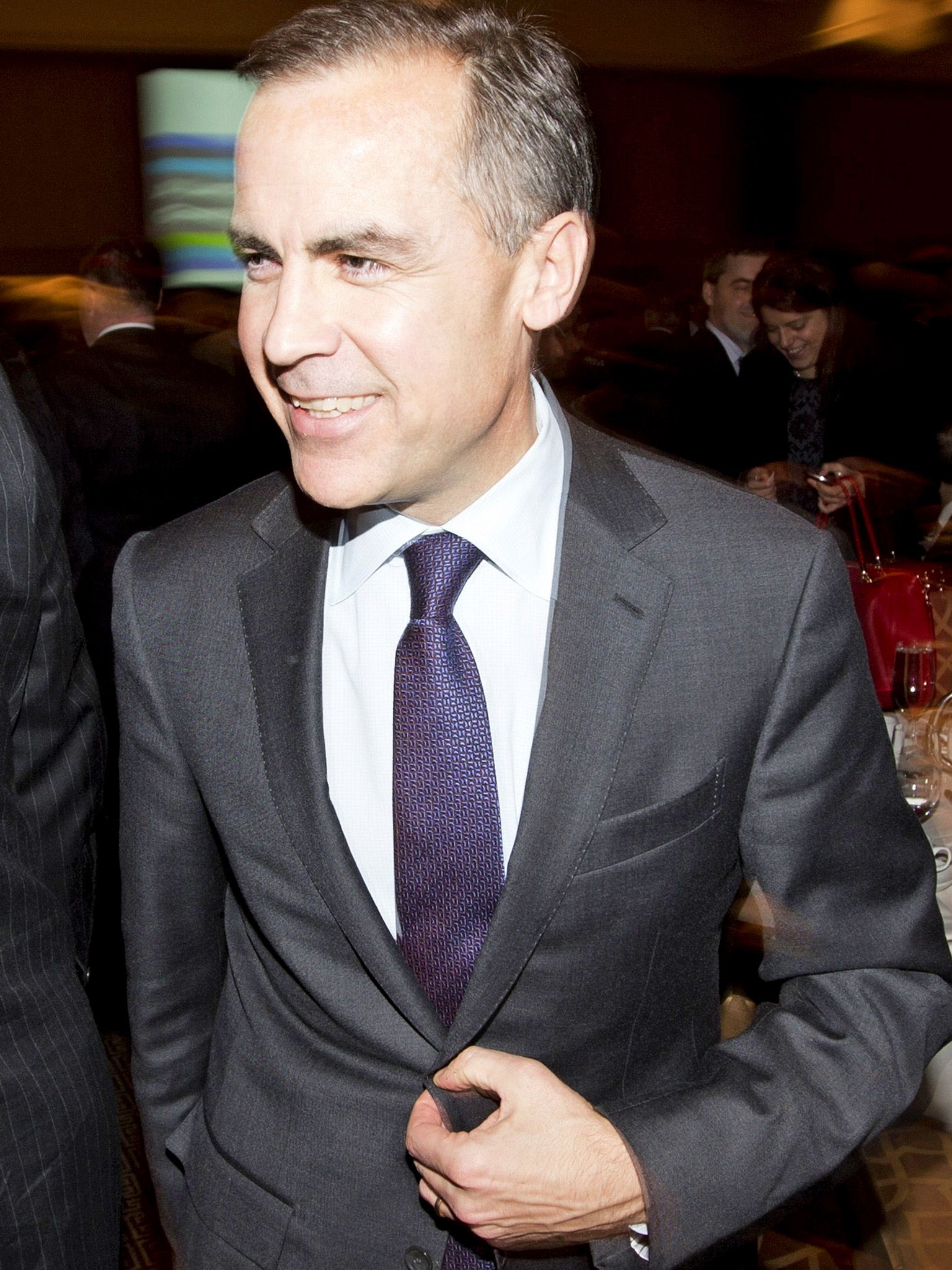Your support helps us to tell the story
From reproductive rights to climate change to Big Tech, The Independent is on the ground when the story is developing. Whether it's investigating the financials of Elon Musk's pro-Trump PAC or producing our latest documentary, 'The A Word', which shines a light on the American women fighting for reproductive rights, we know how important it is to parse out the facts from the messaging.
At such a critical moment in US history, we need reporters on the ground. Your donation allows us to keep sending journalists to speak to both sides of the story.
The Independent is trusted by Americans across the entire political spectrum. And unlike many other quality news outlets, we choose not to lock Americans out of our reporting and analysis with paywalls. We believe quality journalism should be available to everyone, paid for by those who can afford it.
Your support makes all the difference.Mark Carney has some very long arms. The next Governor of the Bank of England has managed to open a can of worms in London from 3,500 miles away.
At a speech in Toronto on Tuesday evening, Mr Carney, serving out his notice as head of the Bank of Canada before slipping into the Threadneedle Street hot seat, suggested a nominal gross domestic product (NGDP) target might be more appropriate for central banks than a traditional inflation target when an economy is in a slump and policy rates are already low.
Though Mr Carney stressed that he wasn't outlining a manifesto, his words have inevitably been interpreted as an aspiration. And it makes for a revolutionary aspiration. An NGDP target in Britain would mean scrapping the 2 per cent inflation target that has bound the Bank since it was granted independence in 1997.
Ros Altmann, director general of the elderly pressure group Saga, has been relentlessly critical of the Bank's quantitative-easing (QE) programme for depressing the returns on savings, and she was quick to voice her opposition to Mr Carney's kite-flying today.
"If what he means is surreptitiously abandoning inflation targeting then that would be a very, very big mistake. If he thinks that making inflation even higher will help growth then he is looking down the wrong end of the telescope" she said.
The Bank's chief economist, Spencer Dale, seemed to have been caught on the hop by his next boss's musing.
"There are costs and risks associated with committing to levels of nominal GDP," he said, while stressing it was important to keep an open mind about monetary stimulus.
Hard-money types, who welcomed Mr Carney with open arms when his unexpected appointment was announced by the Chancellor last month, have sniffed that the Bank has already effectively abandoned the inflation target as it has persistently been above 2 per cent since the 2008/09 recession.
But there could be still more inflation under a NGDP target. The logic of such a shift is that the Bank aims for annual growth in national output unadjusted for inflation. Advocates usually talk of a figure of around 5 per cent.
As the graph above shows, NGDP was growing at around this level in the first decade of the Bank's independence after 1997. There was a sharp fall in the Great Recession. But since then the rate of NGDP growth has not returned to 5 per cent, despite the higher inflation of recent years.
If the Bank had an NGDP target now, it would have more room for monetary stimulus. That would imply more QE and higher inflation in the short term to hit the target.
The saving lobby, as Ms Altmann's reaction shows, would be up in arms. But would the wider economy benefit? It is very hard to say.
Advocates of NGDP are confident it would work. They say the policy shift would push up inflation and growth expectations, persuading consumers and businesses to start spending, instantly kick-starting the economy. They even suggest an NGDP target would have such a significant psychological impact that the Bank's monetary policy committee (MPC) might not even need to engage in further stimulatory bond purchases.
They might be correct. Or they might be engaging in wishful thinking. Since no central bank has actually attempted NGDP targeting we have nothing to guide us.
But would the Government be bold enough to change the Bank's mandate? There are reasons to think Mr Carney may be pushing on an open door, at least with some ministers. The Business Secretary, Vince Cable, has come out in favour of the approach, pointing out it was a massive monetary loosening (coming off the Gold Standard) that helped Britain recover from the Great Depression in the 1930s.
As for the Chancellor, Mr Osborne sounded the alarm bell over QE in opposition calling it "the last resort of desperate governments". But at the Treasury he has repeatedly stressed that he is in favour of fiscal conservatism and monetary radicalism.
The present Governor, Sir Mervyn King, has been less than radical, eschewing a bright idea by the former MPC member, Adam Posen, for the Bank to buy up corporate bonds and securitised mortgages, rather than just gilts, to make QE more effective.
It's hard to believe Mr Carney did not discuss his views on NGDP targeting with Mr Osborne when the latter was courting him for the job at the Bank earlier this year.
And for a Chancellor contemplating a triple-dip recession and an economy that looks set to be smaller than its 2008 peak by the time of the next election, Mr Carney's can of worms must look quite attractive.

Join our commenting forum
Join thought-provoking conversations, follow other Independent readers and see their replies
Comments